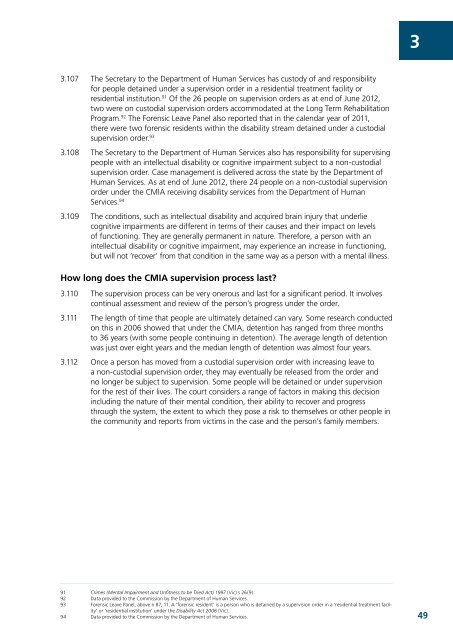Crimes Mental Impairment consultation paper.pdf - Victorian Law ...
Crimes Mental Impairment consultation paper.pdf - Victorian Law ...
Crimes Mental Impairment consultation paper.pdf - Victorian Law ...
Create successful ePaper yourself
Turn your PDF publications into a flip-book with our unique Google optimized e-Paper software.
3<br />
3.107 The Secretary to the Department of Human Services has custody of and responsibility<br />
for people detained under a supervision order in a residential treatment facility or<br />
residential institution. 91 Of the 26 people on supervision orders as at end of June 2012,<br />
two were on custodial supervision orders accommodated at the Long Term Rehabilitation<br />
Program. 92 The Forensic Leave Panel also reported that in the calendar year of 2011,<br />
there were two forensic residents within the disability stream detained under a custodial<br />
supervision order. 93<br />
3.108 The Secretary to the Department of Human Services also has responsibility for supervising<br />
people with an intellectual disability or cognitive impairment subject to a non-custodial<br />
supervision order. Case management is delivered across the state by the Department of<br />
Human Services. As at end of June 2012, there 24 people on a non-custodial supervision<br />
order under the CMIA receiving disability services from the Department of Human<br />
Services. 94<br />
3.109 The conditions, such as intellectual disability and acquired brain injury that underlie<br />
cognitive impairments are different in terms of their causes and their impact on levels<br />
of functioning. They are generally permanent in nature. Therefore, a person with an<br />
intellectual disability or cognitive impairment, may experience an increase in functioning,<br />
but will not ‘recover’ from that condition in the same way as a person with a mental illness.<br />
How long does the CMIA supervision process last<br />
3.110 The supervision process can be very onerous and last for a significant period. It involves<br />
continual assessment and review of the person’s progress under the order.<br />
3.111 The length of time that people are ultimately detained can vary. Some research conducted<br />
on this in 2006 showed that under the CMIA, detention has ranged from three months<br />
to 36 years (with some people continuing in detention). The average length of detention<br />
was just over eight years and the median length of detention was almost four years.<br />
3.112 Once a person has moved from a custodial supervision order with increasing leave to<br />
a non-custodial supervision order, they may eventually be released from the order and<br />
no longer be subject to supervision. Some people will be detained or under supervision<br />
for the rest of their lives. The court considers a range of factors in making this decision<br />
including the nature of their mental condition, their ability to recover and progress<br />
through the system, the extent to which they pose a risk to themselves or other people in<br />
the community and reports from victims in the case and the person’s family members.<br />
91 <strong>Crimes</strong> (<strong>Mental</strong> <strong>Impairment</strong> and Unfitness to be Tried Act) 1997 (Vic) s 26(9).<br />
92 Data provided to the Commission by the Department of Human Services.<br />
93 Forensic Leave Panel, above n 87, 11. A ‘forensic resident’ is a person who is detained by a supervision order in a ‘residential treatment facility’<br />
or ‘residential institution’ under the Disability Act 2006 (Vic).<br />
94 Data provided to the Commission by the Department of Human Services.<br />
49

















